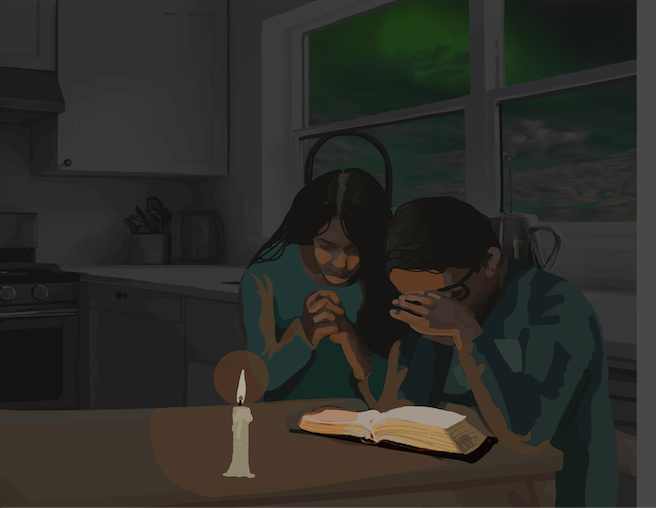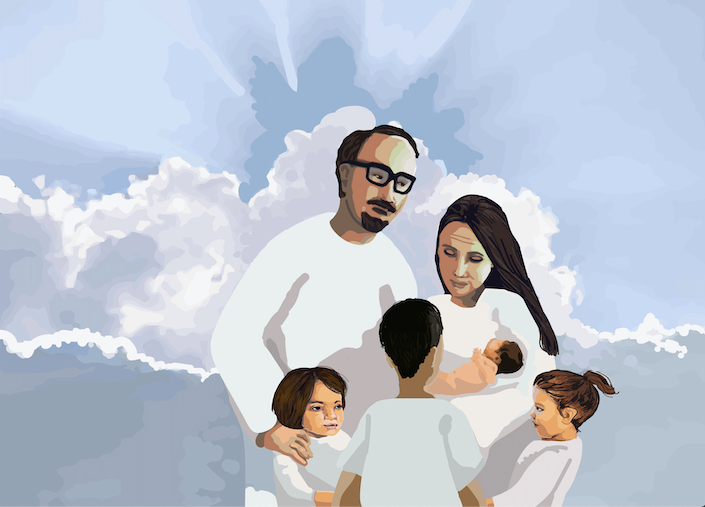Summary
There is a wide range of passages in the Old and New Testament that speak of the rapture of faithful believers to heaven prior to the designated time of end times trials and tribulations. These references can be found in Isaiah 26:19-21, Isaiah 57:1-2, Zephaniah 2:1-3, Malachi 3:16-18, Micah 7:1-2, Psalm 50:3-6, Luke 21:36, John 14:1-3; 1 Corinthians 15:51-58, and in 1 Thessalonians 4:13-18, for instance.
These passages do not specify, however, what will happen to children and the feeble-minded (who cannot make a decision for Jesus as their Lord and Savior). Studying the Scriptures, we can discern that there are both general principles and specific references that offer us insight and understanding regarding this important, impactful, but rarely taught topic.
This article is a Scriptural exploration of these references in both Testaments and hopefully serves as an encouragement to you to search the Scriptures yourself and share your findings with others. It is my understanding that Scripture offers us assurance that children up to the age of 19 and the feeble-minded will be safeguarded in heaven prior to the designated end times judgment events fall in all earnest.
The summary and main article have been updated on 8/2; the first version of the article is preserved in the end notes.
Starting our exploration
During the Exodus in Moses’ days, the Old Testament principle was established by the Lord, that children residing within the homes of God-fearing and obedient caregivers, were kept safe from the escalating judgments that fell upon the wayward, rebellious and disobedient in Egypt. The Exodus judgment cycle culminated in the death of the firstborn of those who remained in willful disobedience and opposition to the Lord, thus forfeiting his divine protection and provision amidst judgment.
The households of those who had obeyed the Lord’s instructions to keep the Passover were kept safe. Note that in verse 24 below, it is stated that the Passover observance was instituted as an eternal ordinance, thus applying in our time as well.
Exodus 12:21 Then Moses called for all the elders of Israel, and said unto them, Draw out and take you a lamb according to your families, and kill the passover. 22 And ye shall take a bunch of hyssop, and dip [it] in the blood that [is] in the bason, and strike the lintel and the two side posts with the blood that [is] in the bason; and none of you shall go out at the door of his house until the morning. 23 For the LORD will pass through to smite the Egyptians; and when he seeth the blood upon the lintel, and on the two side posts, the LORD will pass over the door, and will not suffer the destroyer to come in unto your houses to smite [you]. 24 And ye shall observe this thing for an ordinance to thee and to thy sons for ever. 25 And it shall come to pass, when ye be come to the land which the LORD will give you, according as he hath promised, that ye shall keep this service. 26 And it shall come to pass, when your children shall say unto you, What mean ye by this service? 27 That ye shall say, It [is] the sacrifice of the LORD’S passover, who passed over the houses of the children of Israel in Egypt, when he smote the Egyptians, and delivered our houses. And the people bowed the head and worshipped. 28 And the children of Israel went away, and did as the LORD had commanded Moses and Aaron, so did they.
This eternal statute foreshadowed the future blood atonement of the Lord’s only begotten Lamb, our Redeemer Jesus Christ, applied to believers’ hearts and minds (reflective of the doorposts of our bodily temple or dwellings) as an important foundational principle. The New Testament Book of Matthew 19 affirms this eternal statute in Jesus’ embodiment of love, accessibility, and providence for children and blessing them as citizens of the eternal kingdom of heaven:
19:13 Then were there brought unto him little children, that he should put his hands on them, and pray: and the disciples rebuked them. 14 But Jesus said, Suffer little children, and forbid them not, to come unto me: for of such is the kingdom of heaven.
Mark 10:13-16 echoes this principle in his account of the event, extending Jesus’ teaching toward adults, to receive God’s kingdom as a child to be eligible to enter:
10:13 And they brought young children to him, that he should touch them: and his disciples rebuked those that brought them. 14 But when Jesus saw it, he was much displeased, and said unto them, Suffer the little children to come unto me, and forbid them not: for of such is the kingdom of God. 15 Verily I say unto you, Whosoever shall not receive the kingdom of God as a little child, he shall not enter therein. 16 And he took them up in his arms, put his hands upon them, and blessed them.
In Luke 18 Jesus speaks of children being permitted to come to him unhindered and calls them to him personally (ref. Tim Foster)
18:15 Now they were bringing even infants to him that he might touch them. And when the disciples saw it, they rebuked them. 16 But Jesus called them to him, saying, Let (Strong’s 863, send away, let go, permit to depart) the children come to me, and do not hinder them, for to such belongs the kingdom of God.
Hosea 9 then gives us insight into God’s sovereignty regarding either receiving or preventing children from being born in a general sense, as well as the specific possibility of God’s intervention by taking children away from their parents, in this case as a form of judgment.*corrected 7/30
Hosea 9:11-14 As for Ephraim (a type of the firstborn nation of God, the US, that will be judged first in the end times), their glory shall fly away like a bird, from the birth, and from the womb, and from the conception. 12 Though they bring up their children, yet will I bereave them, that there shall not be a man left: yea, woe also to them when I depart from them! 13 Ephraim, as I saw Tyrus, is planted in a pleasant place: but Ephraim shall bring forth his children to the murderer. 14 Give them, O LORD: what wilt thou give? give them a miscarrying womb and dry breasts. 15 All their wickedness is in Gilgal: for there I hated them: for the wickedness of their doings I will drive them out of mine house, I will love them no more: all their princes are revolters. 16 Ephraim is smitten, their root is dried up, they shall bear no fruit: yea, though they bring forth, yet will I slay even the beloved fruit of their womb. 17 My God will cast them away, because they did not hearken unto him: and they shall be wanderers among the nations.
Verse 11 recounts that “the glory will fly away like a bird” (referred to as “splendor” in the ESV). The glory or splendor represents those Christians who are accounted worthy to be taken in the initial worldwide rapture (faithful believers or overcomers in Christ), along with the innocent in Christ. The phrase “like a bird” alludes to the bodily transformation that occurs during the rapture and the lifting up to heaven by the Lord’s angels. This bird is the same one that escapes “like a bird from the fowler’s snare”, referred to in Luke 21:35 and Psalm 91:3-4:
Luke 21:34 And take heed to yourselves, lest at any time your hearts be overcharged with surfeiting, and drunkenness, and cares of this life, and so that day come upon you unawares. 35 For as a snare shall it come on all them that dwell on the face of the whole earth. 36 Watch ye therefore, and pray always, that ye may be accounted worthy to escape all these things that shall come to pass, and to stand before the Son of man.
Psalm 91:1 He that dwelleth in the secret place of the most High shall abide under the shadow of the Almighty. 2 I will say of the LORD, He is my refuge and my fortress: my God; in him will I trust. 3 Surely he shall deliver thee from the snare of the fowler, and from the noisome pestilence. 4 He shall cover thee with his feathers, and under his wings shalt thou trust: his truth shall be thy shield and buckler. 5 Thou shalt not be afraid for the terror by night; nor for the arrow that flieth by day; 6 Nor for the pestilence that walketh in darkness; nor for the destruction that wasteth at noonday.


In contrast with the opening verses in Psalm 91 pertaining to those abiding in Christ, Isaiah 47 refers to the judgments that will fall upon those who refuse to seek shelter in the Lord’s salvation and protection. They are referred to as “daughters of Babylon,” a description and typology of those who are entangled in idolatry and mired religious practices, who prioritize self-will and worldliness over adherence to God by his Word and the Holy Spirit’s leading. Given the accumulation of their sins of ‘incantations and sorceries’, the bereavement of their children, loss of their faithful spouses and sudden devastation will fall upon them suddenly.
Isaiah 47:8 Therefore hear now this, thou that art given to pleasures, that dwellest carelessly, that sayest in thine heart, I am, and none else beside me; I shall not sit as a widow, neither shall I know the loss of children: 9 But these two things shall come to thee in a moment in one day, the loss of children, and widowhood: they shall come upon thee in their perfection for the multitude of thy sorceries, and for the great abundance of thine enchantments. 10 For thou hast trusted in thy wickedness: thou hast said, None seeth me. Thy wisdom and thy knowledge, it hath perverted thee; and thou hast said in thine heart, I am, and none else beside me. 11 Therefore shall evil come upon thee; thou shalt not know from whence it riseth: and mischief shall fall upon thee; thou shalt not be able to put it off: and desolation shall come upon thee suddenly, which thou shalt not know.
This judgment of those in spiritual adultery losing their little ones and their homes becoming desolate is confirmed in Jeremiah 10 and 50:
10:20 My tabernacle is spoiled, and all my cords are broken: my children are gone forth of me, and they are not: there is none to stretch forth my tent any more, and to set up my curtains.
50:44 Behold, he shall come up like a lion from the swelling of Jordan unto the habitation of the strong: but I will make them suddenly run away from her: and who is a chosen man, that I may appoint over her? for who is like me? and who will appoint me the time? and who is that shepherd that will stand before me? 45 Therefore hear ye the counsel of the LORD, that he hath taken against Babylon; and his purposes, that he hath purposed against the land of the Chaldeans: Surely the least of the flock shall draw them out: surely he shall make their habitation desolate with them. 46 At the noise of the taking of Babylon the earth is moved, and the cry is heard among the nations.
Likewise in Ezekiel 24, which affirms the sovereign Lord will take the children, as part of his judgments:
24:25 Also, thou son of man, shall it not be in the day when I take from them their strength, the joy of their glory, the desire of their eyes, and that whereupon they set their minds, their sons and their daughters,
Isaiah 49:22-25 speaks of the safeguarding of gentile sons and daughters, being taken to heaven by the Lord’s divine messengers:
22 Thus saith the Lord GOD, Behold, I will lift up mine hand to the Gentiles, and set up my standard to the people: and they shall bring thy sons in [their] arms, and thy daughters shall be carried upon [their] shoulders. 23 And kings shall be thy nursing fathers, and their queens thy nursing mothers: they shall bow down to thee with [their] face toward the earth, and lick up the dust of thy feet; and thou shalt know that I [am] the LORD: for they shall not be ashamed that wait for me. 24 Shall the prey be taken from the mighty, or the lawful captive delivered? 25 But thus saith the LORD, Even the captives of the mighty shall be taken away, and the prey of the terrible shall be delivered: for I will contend with him that contendeth with thee, and I will save thy children.



The departure of the innocent and the three days of darkness
The Lord’s safety provisions for the innocent and his faithful overcomers amidst the forthcoming judgments are described in more detail in this article about the three days of darkness and the Second Exodus.
The article details that the Lord’s end times harvesters (a subset of faithful believers, referenced in Revelation 14:4) and innocent in Christ worldwide are expected to be taken to heaven at the onset of these three days of supernatural darkness, which will be preceded by clear warning signs. These warning signs include worldwide earthquakes, red skies and auroras (dazzling, colorful lights), which will be discernible for 2 up to 48 hours before supernatural darkness falls, depending on where you live. The thick and oppressive darkness will fall at noontime and will cover the earth for 72 hours, or three full days. During this time of darkness, demons will be released to wander the earth. They are licensed to harm, possess, and kill anyone left outside the Lord’s protection. People are instructed to remain indoors with their access-ways locked and remain in prayer until the darkness is lifted.
The majority of faithful believers will remain on earth, when the Lord’s harvesters and innocent are taken, and are expected to be raptured to heaven shortly afterward. Therefor, if faithful believers witness a faithful family member, a child or feeble minded loved one supernaturally disappear at the onset of the three days of darkness, they need not fear, not for their loved ones’ safety and wellbeing, nor for themselves (for thinking they may have missed the worldwide departure, for instance, which is not the case). They are instructed to remain indoors and not venture outside looking for those who have disappeared, and they are assured to be reunited with them shortly. The remaining faithful are expected to be taken to heaven shortly afterward in the worldwide departure of all overcomers in Christ, also known as the first group-harvest or rapture (Luke 12:37-48, Revelation 3:12, 1 Thessalonians 4:16-17, Daniel 12:1, Luke 21:36, Hosea 6:2, Ezekiel 34:11-13).
The early departure of certain chosen faithful believers and the innocent is not expected by most (including faithful believers) and unless people are Biblically informed and instructed, remaining parents and other loved ones can understandably be overwhelmed, perplexed and distraught if confronted with their supernatural disappearance (Lamentations 2:10). Many outside Christ may resort to panic if they lack knowledge and understanding concerning the whereabouts and wellbeing of their loved ones.
Matthew 24:19 But woe to those who are pregnant and to those who are nursing in those days! 20 But pray that your flight be not in winter, nor on a sabbath. 21 For then shall be great tribulation, such as hath not been from the beginning of the world until now, neither shall be.
This passage is confirmed in Mark 13:
Mark 13:17-19 But woe to those who are pregnant and to those who are nursing in those days! 18 But pray that your flight be not in winter. 19 For those days shall be such tribulation, the like of which has not been from the beginning of the creatures which God created until now, neither shall be.
In Luke 23:28-29, Jesus specifically says to the women of Jerusalem during his crucifixion:
28 And Jesus, turning to them, said, Daughters of Jerusalem! do not weep for me, but weep for yourselves and for your children. 29 For behold, the days are coming in which they shall say, Blessed are the barren, and the wombs that never bore, and the breasts that never nursed.
Being well informed and instructed will help you prepare yourself and your household both spiritually and physically and support and comfort others.
The unborn
In the case of pregnant women who are confronted with the sudden, supernatural disappearance of their unborn children, we can discern that these children are also safeguarded in heaven. Scripturally, life begins at the moment of conception, and all unborn children belong to the Lord. They cannot make a decision for him yet and are considered innocent (1 John 2:22).
Hosea 9:14 fine-tunes the principle of God’s sovereignty over all children and recounts children disappearing from their mothers’ wombs, them miscarrying, and their breasts withering as an expression of his judgment. Hosea 9:14 in context:
9:12 Though they bring up their children, yet will I bereave them, that there shall not be a man left: yea, woe also to them when I depart from them! 13 Ephraim, as I saw Tyrus, is planted in a pleasant place: but Ephraim shall bring forth his children to the murderer. 14 Give them, O LORD: what wilt thou give? give them a miscarrying womb and dry breasts. 15 All their wickedness is in Gilgal: for there I hated them: for the wickedness of their doings I will drive them out of mine house, I will love them no more: all their princes are revolters.

Unlike regular miscarriages, raptured unborn children will have vanished supernaturally, instantly and completely. This phenomenon of instant disappearance without a trace cannot be explained away naturally, and will shock unsuspecting parents and others witnessing these events without foreknowledge to their core, deeply desiring satisfying answers. Medical experts may attempt to, but will be unable to naturally explain this sudden, worldwide removal of unborn children. Many in positions of leadership will – no doubt – resort to alternative (supernatural) explanations of the sudden disappearances, many of which will counter the truth of the Bible.
As the subject of the rapture of the innocent is rarely taught or discussed in formal church settings or among more intimate fellowships of believers, few will be able to provide Biblical insight and understanding, which makes people susceptible to accepting misinformation and being misled.

Inaccurate and deceitful explanations
Many falsehoods and lies are expected to be spread about the Lord’s rescuing interventions and the sudden disappearance of the innocent in Christ especially. The Bible warns us about this and arms us against misinformation and deception by providing insight and understanding well before the events take place (2 Thessalonians 2:1-17).
We read in Amos 3:6-7 about the general principle that the Lord provides knowledge and understanding beforehand in all his dealings, through his faithful servants:
Amos 3:6 Shall a trumpet be blown in the city, and the people not be afraid? shall there be evil in a city, and the LORD hath not done it? 7 Surely the Lord GOD will do nothing, but he revealeth his secret unto his servants the prophets.
The spiritual enemy and those who do their bidding are aware of the coming rapture events and will offer unbiblical explanations for the sudden disappearance of millions of children and the Lord’s faithful worldwide, such as ascribing events to ‘aliens’ from other-dimensional civilizations or other ”supernatural intelligent beings’ having taken them elsewhere (for re-eduction, training and/or safekeeping). Either due to ignorance or to purposefully deceive people, governments, religious leaders and so-called ‘experts’ will most likely weigh in and present inaccurate and deceitful explanations as well, in line with the enemy’s predictive programming and great deceptions regarding the earth’s cosmology and the origin and nature of demonic entities. The Bible forewarns us about this specific delusion and deception in 2 Thessalonians 2:1-17.
The Bible not only speaks of how the Lord secures the innocent through the rapture, but also beckons and instructs parents and relatives who witness their departure to wholeheartedly repent of their sins, seek salvation in the Lord Jesus and fully submit their lives unto him, if they haven’t yet. As they endure in faith, they will be reunited with both Him and their raptured loved ones in heaven for all eternity. To those submitting themselves wholeheartedly unto the Lord, the departure and safeguarding of the innocent is only a temporary separation and loss.

Hope and comfort for those remaining
During the upcoming three days of darkness many people will come to a saving knowledge of Jesus Christ or will return from prior waywardness, rebellion and lukewarmness. Rudely awakened by the rapidly unfolding supernatural events, especially by the rapture of the innocent and onset of total physical and demonic darkness, lukewarm believers and the unsaved will be given opportunity to cry out to the Lord, as he will beckon them to wholeheartedly repent and fully submit their lives to him, so they can be accounted worthy to be taken to heaven in the first, worldwide departure of faithful overcomers, expected to occur at the closing of the three days of darkness (Luke 21:35-36, Joel 2:11-32, Psalm 91).
Joel 2 gives us a description of the period surrounding the rapture of the innocent and the faithful and confirms to us that there is hope for salvation and thus of being reunited in heaven with raptured loved ones:
11 And the LORD shall utter his voice before his army: for his camp is very great: for he is strong that executeth his word: for the day of the LORD is great and very terrible; and who can abide it? 12 Therefore also now, saith the LORD, turn ye even to me with all your heart, and with fasting, and with weeping, and with mourning: 13 And rend your heart, and not your garments, and turn unto the LORD your God: for he is gracious and merciful, slow to anger, and of great kindness, and repenteth him of the evil. 14 Who knoweth if he will return and repent, and leave a blessing behind him; even a meat offering and a drink offering unto the LORD your God? 15 Blow the trumpet in Zion, sanctify a fast, call a solemn assembly: 16 Gather the people, sanctify the congregation, assemble the elders, gather the children, and those that suck the breasts: let the bridegroom go forth of his chamber, and the bride out of her closet. 17 Let the priests, the ministers of the LORD, weep between the porch and the altar, and let them say, Spare thy people, O LORD, and give not thine heritage to reproach, that the heathen should rule over them: wherefore should they say among the people, Where is their God? 18 Then will the LORD be jealous for his land, and pity his people.
The same pattern of family restoration is found in Jeremiah 31:
15 Thus saith the LORD; A voice was heard in Ramah, lamentation, and bitter weeping; Rachel weeping for her children refused to be comforted for her children, because they were not. 16 Thus saith the LORD; Refrain thy voice from weeping, and thine eyes from tears: for thy work shall be rewarded, saith the LORD; and they shall come again from the land of the enemy. 17 And there is hope in thine end, saith the LORD, that thy children shall come again to their own border.


Cut asunder
If lukewarm believers refuse to wholeheartedly repent, trust, and obey the Lord during the three days of darkness, they run the risk of ‘being cut asunder’. This means they can find themselves left behind after the first, worldwide departure of the faithful. Scripture speaks about this consequence in Luke 12:46-48 as well as in Matthew 24:51 and 25:10. The word “asunder” implies being divided from the faithful, to be chastised and severely disciplined along with unbelievers.
Believers, who find themselves left behind after the worldwide rapture of the faithful, will have to endure a time of severe discipline and judgment along with unbelievers to develop overcoming faith then (Romans 11:17-22, Revelation 3:16, Luke 21:36-37, Jeremiah 11:7-12, Hebrews 12:6-7). They will be disciplined by the Lord as they learn to trust and obey him fully amidst persecution and tribulation (Luke 12:46-47, Matthew 24:48-51, Matthew 25:11-12).
This purification and sanctification process is referred to in Scripture as ‘having to buy oil for their dwindling or darkened lamps’ (Matthew 25:1-13) and ‘cleansing their soiled wedding garments’. This means they have to invest their hearts, minds, time and effort fully, to be sanctified and purified and develop enduring faith, so they are spiritually ready to stand before the Lord (Matthew 5:16 & 25:8-10, Isaiah 55:1-7, Revelation 3:18-19).
This will be a considerably more difficult faith walk as prior to the worldwide rapture, as believers will need to maintain a living testimony of Christ until the end of their lives, to enter into heaven. This means they CANNOT take the mark of the beast, as explained in more detail here.
Sufficiency of Jesus’ atoning sacrifice and his nature
Certain Biblical principles and concepts pertaining to the rapture of the innocent deserve to be researched a bit more thoroughly. Let us, for instance, turn to the basic principle that the Bible teaches that the death of Christ suffices for all the sins of all mankind. 1 John 2:2 says that Jesus makes atonement for our sins, and not for ours only, but for the sins of the whole world:
2:1 My little children, these things write I unto you, that ye sin not. And if any man sin, we have an advocate with the Father, Jesus Christ the righteous: 2 And he is the propitiation for our sins: and not for ours only, but also for the sins of the whole world.3 And hereby we do know that we know him, if we keep his commandments.4 He that saith, I know him, and keepeth not his commandments, is a liar, and the truth is not in him.
This verse clearly states that the death of Jesus is sufficient for all sins, not just the sins of those who specifically believe in Him. If the death of Christ suffices for all sins, then it leaves open the possibility that the Lord applies that blood atonement to people who have been unable to believe or who are severely limited to make a decision for Christ. Although the Bible does not explicitly state this, it allows for this interpretation. Thus, it is reasonable to affirm this perspective without being dogmatic, acknowledging that other possibilities exist.
Based on the principle of Jesus’ loving sacrifice on the cross, not only children up to the state of accountability, but also people who are not able to believe in Jesus from birth, for example due to a (mental) disability or other mental weakness, are safeguarded. Both children and the feeble minded are – in principle – preserved by the Lord, if they have not (yet) developed the capacity for conscientious accountability. They belong to Jesus and their sins are automatically atoned for through his atoning sacrifice.
In addition to the sufficiency of Jesus’ sacrifice, we are also assured that the Lord is perfectly loving, just, holy, and merciful. Whatever he does, allows or decides, it is ALWAYS right and good. We can fully adhere to that. He is the Father of all children, young and old (Romans 8:15). His heart and grace are especially open toward children. In the book of Deuteronomy, he prevents an unbelieving generation of Israelites from entering the promised land, while their children were exempt from that penalty (Deuteronomy 1:39). Other verses refer to young children as “innocents,” indicating God treats their naïve sinful desires differently from the willful sinfulness of the mature (Jeremiah 2:34, 19:4). It is the Lord’s expressed will, as versed in Matthew 18:14, that ‘none of these little ones should perish‘.
Lessons from King David
One of the Bible passages that can may increase in our confidence in God’s providence for children and the feeble-minded and reveal the depth of his grace toward adults, is found in the account of King David. The passage from the life history of David that seems more applicable to this subject than any other passage is found in 2 Samuel 12:21-23.
The context of these verses is David’s earlier adultery (recognized as a sinful act by God) with Bathsheba, who was already married. She became pregnant as a result of the adultery and David became increasingly ensnared in sin, which even resulted in the death of Bathsheba’s husband due to David’s ungodly plotting and scheming which caused his death. The Lord directly intervened, and the prophet Nathan was sent to inform David that the Lord would take his son’s life because of his grievous sins, his family structure would be uprooted and strive would enter.
Let us consider that David both sinned consciously and was repeatedly warned before God intervened both directly and drastically. In a similar manner, the Lord diligently warns his current day wayward servants, who are likewise entangled in sin and rebellion, about his end times judgments falling in all earnest shortly. He calls all to wholeheartedly repent from their sins, turn back to him, submit themselves to him fully and walk by faith, love and obedience as an overcomer in Christ, to be accounted worthy to be taken to heaven (Luke 21:36). Just as David was made aware of God’s upcoming dividing sword of judgment in a direct encounter with his prophet, people left behind after the worldwide rapture will become profoundly and painfully aware of the consequences of God’s direct and impactful intervention in their lives.
David understood both God’s irrevocable intervention and the consequences of his sins, but also received a deeper understanding of God’s abundant grace and his heart toward reconciliation and family reunion, as he responded in wholehearted repentance. David submitted himself to the Lord with a contrite heart and mourned, grieved and interceded for his son. But when the child died, David’s mourning period came to an end. David’s servants were very surprised at this, saying: 21 … What thing is this that thou hast done? thou didst fast and weep for the child, while it was alive; but when the child was dead, thou didst rise and eat bread. 22 And he said, While the child was yet alive, I fasted and wept: for I said, Who can tell whether God will be gracious to me, that the child may live? 23 But now he is dead, wherefore should I fast? can I bring him back again? I shall go to him, but he shall not return to me.
David’s response aligns with the Biblical principle that people who cannot make a conscious decision for Christ are safe in Him. David said he would go to the child, but he couldn’t get the child to come back to him. In addition, and this is just as important, we can conclude that David was comforted by this. In other words, David expected to see his child again (after his death), even if he could not bring the child back to this earthly life.
This situation also rests on a principle. While there are temporary, negative consequences for sins committed in life, for believers God removes the eternal negative consequences after genuine repentance. Based on the same principle, we can rest in the fact that if (unborn) babies, young children or the feeble minded die, their souls are saved and they will be with Jesus in heaven for all eternity. Likewise, at the rapture, the innocent will be taken to safety in heaven by the Lord and will thereby be exempt from the subsequent trials intended to bring lukewarm, rebellious and unsaved adults to wholehearted repentance and enduring faith.
Original sin
The Bible also tells us, as a general principle, that all people, including babies, children, and the feeble minded, are guilty before God because of original sin and imputed sins, even though they may not have committed any personal sins at the time of their death. Original sin was passed on to us through our ancestors.
King David’s account offers us clues about how original sin relates to the fate of children who die prematurely. In Psalm 51:7 he wrote of original sin: “I was guilty when I was born, already sinful when my mother conceived me.” David recognized that he was a sinner even before he was born. The sad fact that babies sometimes die, demonstrates that babies are also afflicted by Adam’s sin, because physical and spiritual death are the result of his original sin.
Therefor, every human being is essentially guilty before God and has basically transgressed the holiness of God. The only way God can be just and at the same time consider a mature, sane person to be righteous, is if he or she believes in Jesus Christ and asks for forgiveness of their sins. Acceptance of Jesus as Savior and Lord is the only way to get to heaven, and not be subject to eternal punishment in hell. In John 14:6 we read what Jesus said about this: 6 …, I am the way, the truth, and the life: no man cometh unto the Father, but by me. Peter confirms this in Acts 4:12: Neither is there salvation in any other: for there is none other name under heaven given among men, whereby we must be saved.
What about those who have not (or have not been) able to make this choice? Children and young adults who have not yet reached the “state of spiritual accountability” and therefore cannot yet give a spiritual account, are considered ‘safe in Jesus’. The underlying principle of ‘salvation before accountability’ is the premise that God saves all people who die before they have been able to make a decision for or against Jesus Christ. This also applies to mentally feeble people from birth who cannot make a decision for Christ, not even when they reach adulthood in terms of lifespan.
When the commandment came
In the Apostle Paul’s letter to the Romans, he offers insight into the principle of granting exemption to children and the feeble-minded from the trials and tribulations that will follow after the rapture. Namely, until the moment that Paul describes in Romans 7:9 as ‘when the commandment came‘ – which can be seen as the awareness of the need for salvation resulting in the attainment of ‘the state of accountability’ – the sinful nature of children does exist, but God does not impute sin to them eternally.
Romans 7:8 But sin, taking occasion by the commandment, wrought in me all manner of concupiscence. For without the law sin was dead. 9 For I was alive without the law once: but when the commandment came, sin revived, and I died. 10 And the commandment, which was ordained to life, I found to be unto death. 11 For sin, taking occasion by the commandment, deceived me, and by it slew me. 12 Wherefore the law is holy, and the commandment holy, and just, and good.
Embracing the fundamental principles of human responsibility and accountability, it becomes evident that every sound-minded individual, from a tender age, comprehends the importance of adhering to instructions. Their attitudes, actions and choices reveal their inner state (Proverbs 20:11). This awareness instills in us the understanding that willful disobedience can result in necessary correction, discipline, or even justifiable consequences by those in authority over us. Paul emphasizes the crucial moment when the commandment, or God’s law, is fully realized in one’s life. It is during this significant juncture that individuals come to acknowledge their inherent sinfulness, recognizing that they have the capacity to not only defy human authorities and transgress societal laws, but also transgress the Lord’s divine commandments, inevitably leading to not only temporal earthly consequences, but to the the grave repercussion of eternal damnation and separation from God as well.
The inherent function of our conscience and moral nature, as described in Romans 1:18, 1:26, 1:32, and 2:15, unveils our growing sense of responsibility and the vital need to embrace Jesus’ salvation and redemption. This transformative process is directly linked to our relationship with the Lord, as we are individually beckoned and drawn by the Holy Spirit toward him. Intercession, flanking Godly testimonies and spiritual support from faithful believers and spiritual mentors can play an influential role in our journey towards embracing the grace and truth found in Jesus Christ.
Only God Himself possesses the power to enable one’s salvation and determines one’s spiritual accountability, though. The redemption of every individual’s soul can be influenced by, but does not rely on social context or intervention. Hebrews 10 teaches us, among other things, how obedience to God’s commandments is made possible through one’s faith in Jesus’ redemptive and sanctifying work and how only God can replace our rebellious ‘heart of stone’ and disobedience with ‘a heart of flesh’, in loving imitation of him who loved us first. We also read in the Paul’s letter to the Romans that children can receive from God before they are even born again (saved). We discern from this epistle that children can earnestly seek Jesus and receive salvation from a very young age. His outstretched hand of grace, mercy, and salvation is independently accepted or rejected from our young to old age, and spiritual salvation can be influenced by, but is not dependent upon our social context or third party involvement.
Let us also explore the interplay between Jewish traditions and writings in relation to Scripture, departing from the principle that Scripture holds ultimate authority over religious traditions and extra-Biblical writings.
Adulthood in Scripture
Updated on 8/2 (the first version of the article is found in the end notes)
According to the Word of God, a person becomes an adult when he turns 20 years old. Adults are called “men” or “women”. An “adult” is defined as “a person who is not a child”. A person under the age of 20 is considered a child, Biblically. The Bible refers to all human beings from conception to age 19 as children. This includes the unborn, who in modern terms may be differentiated as ’embryos’ (children from conception to 8 weeks) or ‘fetuses’ (children 8 weeks to birth). Romans 9:11 says the following about babies in the womb: For the children being not yet born, neither having done any good or evil, that the purpose of God according to election might stand, not of works, but of him that calleth;
The Bible uses different words to describe children, some of which make distinctions based on age, such as the use of words as infants, young children, children, boys, girls, little ones, youths, lad etc. The Bible clearly states that a boy is a man under the age of 20. A man is a man 20 years or older. A girl is a woman under the age of 20. A woman is a woman over the age of 20. In I Corinthians 13:11 the apostle Paul states: When I was a child, I spake as a child, I understood as a child, I thought as a child: but when I became a man, I put away childish things. This supports the notion that God does not hold children to the same accountability as he does adults.
From the age of 20, adult authority, access, ability, accountability and responsibility are assigned to men and women in the Bible. For example, men were not counted as members of the people of Israel until they reached the age of 20. We also read in Exodus 30:14 that only those who were 20 years old and upward were supposed to offer a temple sacrifice. The same is true of Moses’ census of Israeli soldiers as described in Numbers 18:1-3.
In various other passages we find that people from the age of 20:
- are referred to as adults;
- could speak for themselves and were no longer subject to their parents (John 9:1-3, Ephesians 6:4, Proverbs 22:6)
- had to pay temple taxes (Exodus 30:11-16);
- were allowed to fight in the army (Exodus 38:26, Numbers 1, II Chronicles 31:17; Ezra 3:8;
- were allowed to marry.
Deuteronomy states in 1:39, in the account of the Israelites who were allowed to enter the promised land under the leadership of Joshua and Caleb (this can also be seen as a representation of the rapture to our heavenly, promised land), that both young children (‘ children’) when children (in this situation the upper limit of childhood was set at 19 years) were granted access by the Lord:
36 Except Caleb the son of Jephunneh; he shall see, and to him will I give the [promised] land whereon he trod, and to his children; because he has persevered to follow the LORD. 37 The LORD was also angry with me for your sake, saying, Neither shall you go in thither. 38 Joshua the son of Nun, who stands before you, he shall come in there; strengthen him, for he will cause Israel to inherit. 39 And your little ones, of whom you said, They shall be a prey; and your children, who today know neither good nor bad, they shall come therein, and to them will I give it, and they shall inherit it.
In Numbers 32:11-12 we find confirmation of this age limit:
11 The men that came out of Egypt, from twenty years old and upward, shall not see the land which I swore to give to Abraham, Isaac, and Jacob! For they have not persevered to follow me, 12 except Caleb the son of Jephunneh the Kenezite, and Joshua the son of Nun, for they have persevered to follow the LORD.
Although most kings began their kingship over the age of 20, there were exceptions, such as Joash (7 years, 2 Chron. 24:1), Uzziah (16 years, 2 Chron. 26:3), Manasseh (12 years, 2 Chron. 33:1), Josiah (8 years, 2 Chron. 34:1), and Jehoiachin (8 years, 2 Chron. 36:9).
Each of these references shows a pattern in that 20 years is the generic age at which one is considered an adult and assigned adult responsibilities that extend to spiritual service in the temple. That does not mean that a 19-year-old cannot be mature in thought and deed, nor does it guarantee that anyone over 20 is necessarily mature. This notion, of course, is not a license for anyone under the age of 20 to be extravagant of God’s grace and mercy or to live a sinful life (also called “hyper-grace”) either. Nor does this principle exclude exceptions, expressed in multiple Scripture accounts when the Lord intervened and severely punished wicked youth, even unto death (cited below).
If we apply this age limit to the rapture of the children, this means that – in principle – children 19 years and younger (all below 20) are considered safe in Christ and will be raptured, as I discern it (departing from the understanding the Lord is sovereign in his personal determination and there are known exceptions, as cited below).
Jewish tradition and teachings
Updated on 8/2 (the first version of the article is found in the end notes, plus resources on wrestling with the collective or individual ‘age’ versus the ‘state’ of accountability approaches)
In Jewish tradition and interpretation of Scripture, the phase of commencing accountability before God’s laws begins at the age of twelve (for girls) or thirteen (for boys). From then on, the young person can testify in court and be indicted and punished, for example. A well-known Jewish tradition, which incidentally distinguishes between boys and girls in age, is that boys who reach the age of 13 are considered young adults. This tradition has been ritualized through the so-called ‘Bar Mitzvah’ celebrations. From that point onward, Jewish boys become accountable before God to keep all commandments and prohibitions under Jewish law. This precept is partly derived from the Torah, but also from the Mishnah, oral traditions and commentaries (which, incidentally, contradict each other in part) including the anti-Biblical Talmudic writings they are required to study.
When a boy reaches the age of ‘Bar Mitzvah,’ all the weight of responsibility still lies on the shoulders of his parents. So, even after this momentous occasion, the parents continue to bear the responsibility for his further upbringing and education as a young man. It is crucial to recognize that at this stage, a young man is not yet considered completely independent. For example, only from the age of twenty should a man, according to Jewish traditions, be able to provide for himself independently, as an expression of maturity (Rabbi Yehudah ben Tema, Avot 5:25). According to Jewish rabbis (Rashi), the age of twenty for both boys and girls refers to the age when the ‘heavenly court’ ‘pursues’ a person for his actions, holding him or her accountable for ‘divine punishment’ for sins committed (ArtScroll Siddur, 578).
As for the age difference in incipient responsibility among Jewish teens, we see that when a Jewish girl reaches the age of twelve, she is already held accountable under Jewish law. At that point, the girl becomes a ‘Bat Mitzvah’, a so-called ‘daughter of the commandment’.
A collective ‘age of accountability’?
Some advocates of a 12-13 year old, collective determination of the ‘age of accountability’, claim that the Bat (12) and Bar (13) Mitzvah-ages define and support a collective, age-based (and gender defined) border. This view is not in line with the Jewish own understanding however, of seeing these youth as young adults under training, carrying shared responsibility with their parents.
Acknowledging the partial resonance with Jewish tradition and writings, I do not see such an explicit age-based, collective and gender-specific agreement with Scripture either. It is my understanding Scripture adopts an approach of individual accountability under God’s sovereignty when it comes to its eternal implications, which is not (collectively) differentiated by gender. Meaning, the determination of the state and eternal implications of each individual’s spiritual accountability are determined by the Lord, thus rest under his sovereignty.
We can discern that this Jewish tradition has areas of clear contention and even foundational contradiction with Scripture, which make interjection of Scripture with their tradition unsound. The concept of OT law-keeping as a prerequisite for salvation is a critical example of contradiction to the New Testament precept of salvation by grace through faith in Jesus, for instance. The requirement for Jewish young adults to study the anti-Biblical Talmud is another clear example. The Talmud is the official compendium of the ancient rabbinical teaching on all aspects of the Old Testament, with particular reference to the Pentateuch, and is believed by its adherents to be as authoritative as the Word of God. It contradicts Scripture on many topics. Talmudists teach, for instance, that belief in Jesus as Lord and Redeemer is an affront to the sovereignty and unity of God.
Some connect the Jewish Bat and Bar Mitswa ages as a collective, gender based accountability marker (or as the marker for a collectively defined age of accountability) to Jesus himself, putting forward the account when he was found teaching at the temple at twelve years of age. This qualification is not aligned with the qualifications in Scripture however, as I understand it. Note that when Jesus taught at the temple at twelve years of age, which impressed the elders so he was well able to reason and eloquent, he is explicitly referred to in Scripture as a child (pais, a child under training, the word can apply to a girl as well) and upon his return was accounted to have submitted to his parents (Luke 2).
We find a second witness to this principle in Mark 5:21-42, speaking about the twelve year old girl (recall this is the Jewish Bat Mitzvah age) whom Jesus raised from death. The girl was called ‘little daughter’ by her father. Jesus himself referred to her as a damsel (referring once again to a child under training), and as a ‘korasion’ a qualification of a girl, little girl or maiden. She was not regarded as an adult.
It is important to note, that while the beginnings of the modern Bar Mitzvah ceremony appeared as early as the sixth century A.D., it was not until the Middle Ages that a fully developed ritual emerged (source). The tradition is therefore not recorded to have been practiced in Biblical times.
Another element to consider: How does Scripture view spiritual authority over children?
Spiritual authority
With regard to the protection, upbringing and moral development of the youth, Scripture refers in particular to the tasks, (spiritual) authority and accountability of parents and other immediate caregivers. In addition, church leaders, employers and government bodies also play an important role in their exercise of authority.
“Foolishness [is] bound in the heart of a child” says the inspired writer of Proverbs (22:15), referring to sin being nestled within us from infancy, rooted and riveted in our innermost, being conceived in sin, and shapen in iniquity … “[but] the rod of correction shall drive it far from him” the verse continues, meaning the corrective rod used by parents and the restraint of the folly that is bound up in children, to reclaiming them from their sinful ways.
The youth can also be ‘enticed’ to sin, according to Proverbs 1:10. Incidentally, how often are parents, educators and other authorities not involved in such enticement. Their Biblical mission ought to ensure that children learn Scripture from childhood onward (2 Timothy 3:15) and are taught to pray earnestly unto the Lord (Judges 13:8). If a child is instructed and trained Biblically, then there is the promise in God’s Word that when they are old, they shall not depart from the Lord’s ways (Proverbs 22:6), though they may stray halfway.
The Bible therefore emphatically mentions the child’s parents as the first designated governing authority, before others are considered, and stubbornness and rebellion were regarded as a grave offenses in children:
Deuteronomy 21:18 If a man have a stubborn and rebellious son, which will not obey the voice of his father, or the voice of his mother, and that, when they have chastened him, will not hearken unto them: 19 Then shall his father and his mother lay hold on him, and bring him out unto the elders of his city, and unto the gate of his place; 20 And they shall say unto the elders of his city, This our son is stubborn and rebellious, he will not obey our voice; he is a glutton, and a drunkard. 21 And all the men of his city shall stone him with stones, that he die: so shalt thou put evil away from among you; and all Israel shall hear, and fear.
So, first there is a task for the parents to inform, instruct, embody and where necessary to discipline and chastise. In the case of persistent disobedience or incorrigibility towards parents, there is a task for externally appointed authorities such as spiritual leaders, law enforcement officers and judges to discipline and punish. If this correction also fails or is absent, even further decay can set in to willful iniquity and malice, even at an early age (see Psalm 58, 2 Chronicles 36, Jeremiah 32:30, Genesis 19:4).
Lessons from the Old Covenant
Updated on 8/2 (the first version of the article is found in the end notes)
If we ask what lessons we can or should learn from the old covenant, the question may arise; “Does the inclusive nature of the Old Covenant apply to the church?” On the day of Pentecost, Peter said to those present:
Acts 2:38 And Peter said unto them, Repent, and be baptized every one of you in the name of Jesus Christ for the remission of sins; and ye shall receive the gift of the Holy Ghost. 39 For the promise is unto you, and to your children, and to all that are afar off, even as many as the Lord our God shall call.
The word used for children here (‘teknon’ in Greek) means ‘child, daughter, son’. Acts 2:39 indicates that forgiveness of sins is available to all (cf. Acts 1:8), including future generations. However, while salvation is open to all children who can and voluntarily make a decision for Christ and baptism is open to saved children as an expression of faith, the practice of baptism itself is not a requirement for salvation and this verse does not teach family salvation, IMO.
In this article you can read more about baptism of children before communion and in this article you can read more about baptism of infants.
Is the spiritual state of parents decisive?
Some state that only children of believers will be raptured. The exclusivity of this view is problematic to me, because it appears to be founded on parental, transferable faith (and indirectly on salvation by grace through faith plus third party involvement) rather than being rooted in the personal and direct grace of God, experienced in a personal relationship with Jesus as our mediator after the Spirit draws a child. We have also discerned that all children and feeble minded, as a rule, are considered safe in Christ.
The fact that parents and other caregivers play a key role in informing, instructing, and exemplifying their children’s spiritual, moral, and normative education is not under discussion.
Family restoration
The principle of family unity in shared faith in Jesus Christ and the principle of restoring broken and weakened family ties after certain family members stray in faith are central themes throughout the Bible. The account of the joyful reunion of the prodigal son with his loving father after the former finally comes to his senses after a great separation and irresponsibility, is a striking and well-known expression of these precepts (Luke 15:11-32). That’s how much the heavenly father loves us; he waits for us full of love and with outstretched arms and will do all he can to bring us to repentance and salvation, enabling us to return into relationship with him and into right standing as his heirs. God the Father desires nothing more than to restore his family and testifies to the utmost of his love, grace and power to save us from sin, the world, our flesh, pride and ultimately from hell.
Addition 8/2 reference to Luke 15:11-32
Negative exceptions regarding children’s innocence
Updated on 8/2 (the first version of the article is found in the end notes)
We can also recognize negative exceptions in Scripture to the principle of children’s innocence:
- A negative exception is found in the group of youth described in 2 Kings 2, who mocked, despised and abused the prophet Elisha, whereupon the prophet cursed them and she-bears came after them who attacked them (‘cleaved’ them). They willfully refused God’s compassionate warnings, ministered through Elisha, and thus walked out from under the Lord’s protective hedge. Deliberately malicious or wicked behavior in youth can therefore also result in severe punishment and even death in young adults. A parallel verse is found in Hosea: “I (God) will meet them as a bear that is bereaved of her whelps, and will rend [tare] the caul of their heart, and there will I devour them like a lion: the wild beast shall tear them. O Israel, thou hast destroyed thyself; but in Me is thine help.” (Hosea 13:8, 9). A commentary on the topic.
- Another example could be genetically hybridized children (individuals who appear human, but whose DNA is mixed with fallen angel DNA), who are therefor not made (or are no longer made) in the image of Christ (ref. Genesis 1:11-12, Genesis 6:1-6, Numbers 13:33, Deuteronomy 7:1-3) and can therefor not enter heaven. This qualification does not apply to children who have been administered the CV19 vaccines, as these do not constitute the mark of the beast, explained in more detail here.
- The wicked and adulterous will be given a ‘sign of Jonah’, a final warning before the Lord’s end times judgments fall in all earnest (Matthew 12, Mark 8, Jonah 1-4, Malachi 4:1, 1 John 5:19). Jonah’s warning was given to Nineveh in its entirety. The Lord made a specific reference to the innocent in Christ as one of his motivating factors (Jonah 4:11) . My article about the three days of darkness covers this warning timeframe in more detail.
It is therefor possible that the above mentioned negative exceptions serve as a legal precedent and prophetic foreshadowing regarding the rapture of the children and feeble minded. Meaning, that in principle, the Lord could – for instance – leave exceptionally disobedient, rebellious, malicious youth behind at the early departure of the innocent, to discipline them, prompt them to repent of their sins, seek him for salvation, and to develop enduring faith in him. Like lukewarm and unsaved adults, these youths would be given opportunity to be accounted worthy to be taken in the worldwide departure at the closing of the three days of darkness if they wholeheartedly repent and submit their lives to the Lord.
End notes
- With much gratitude to Ana from Artsyanaflorida.com for designing the beautiful graphics in this article and to Alexandra for her feedback and for the French translation of the article.
- The first version of the article.
Resources for further study
Jewish tradition and law:
- The Minor in Jewish Law
- The JPS Guide to Jewish Traditions (for further study regarding the Bar Mitzvah traditions)
Wrestling with the topic of accountability:
- https://www.versebyverseministry.org/articles/wrestling_with_god
- https://www.versebyverseministry.org/articles/wrestling_with_god_part_2
- https://www.extremetheology.com/2006/07/age_of_accounta.html
- https://www.versebyverseministry.org/bible-answers/is-there-an-age-of-accountability-in-the-bible http://drmsh.com/romans-512-and-the-fate-of-the-unborn-infants-and-other-
- human-beings-who-cannot-believe/
Perspectives about disabilities in heaven:
My dedicated website about the upcoming three days of darkness with written resources and videos to download, print and share:
https://thethreedaysofdarkness.org
The French version of this website


Very detailed, Sabine. Loved the graphics. We are back from ID. Temps here have been very hot this summer, contrary to the Netherlands. Hugs
>
LikeLiked by 1 person